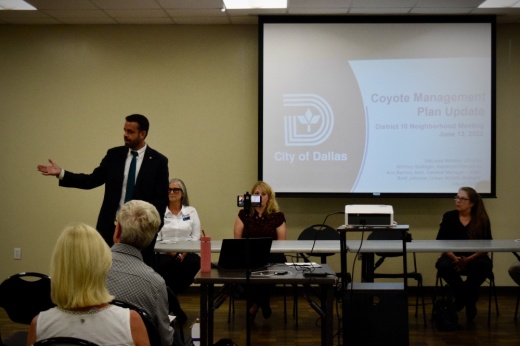Staff with Dallas Animal Services and the Dallas Park and Recreation Department shared details of the plan in a community meeting at the Lake Highlands North Recreation Center. City officials have been working to address concerns following a coyote attack that occurred in the White Rock Valley area on May 3.
Guiding principles behind the plan emphasize both human safety and recognizing the “vital role” coyotes serve in the ecosystem, according to a presentation given by Whitney Bollinger, interim assistant director of Dallas Animal Services.
“The plan is designed to give standardized guidelines on the levels of coyote behavior, to provide information on behavior management techniques and to create a clear program to reduce human-coyote conflicts while prioritizing human safety,” Bollinger said.
Instances of coyote behavior and corresponding city responses were classified into seven escalating levels, from observation of coyotes up to human attacks, according to the draft plan.
The city would seek to further educate community members on how to coexist with coyotes throughout all levels. Killing coyotes would be considered in instances where livestock, attended pets and humans are harmed. However, the presentation warned that disruption of coyote family structures could lead to females breeding more coyotes in higher numbers.
Humane hazing methods to instill “healthy fear” in coyotes was a strategy emphasized by city officials. Basic hazing includes shouting, making loud noises, spraying water, shining bright lights or indirectly throwing objects near coyotes.
Moving forward, Dallas Animal Services officials are seeking to collect data on locations of coyotes throughout the city. Residents were encouraged to utilize the coyote hotline at 469-676-9813 whenever they observe the animals in the wild.
The draft of the plan is not yet available online, according to Dallas Animal Services. However, an online sighting submission form and interactive encounter map are being developed.
In addition, a potential ordinance to limit feeding wildlife is in the works. A draft has been submitted to the city attorney's office for review, and the Quality of Life, Arts & Culture Committee will review the draft on June 21.
A webpage on facts about urban coyotes is available here.





